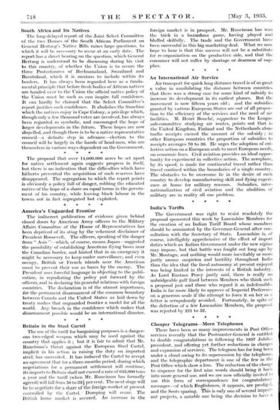An International Air Service Air transport for quick long distance
travel is of so great a value in annihilating the distance between countries that there was a strong case for some kind of subsidy to its development in its earliest phases. But the movement is now fifteen years old ; and the subsidies granted by various European States are out of all propor- tion to the efficiency of the services and the need of air facilities. M. Henri Bouch6, rapporteur to the League sub-committee studying air routes, points out that in the United Kingdom, Finland and the Netherlands alone traffic receipts exceed the amount of the subsidy ; in other European countries the proportion of subsidies to receipts averages 70 to 30. He urges the adoption of col- lective action on a European scale to meet European needs, on economic lines. Civil aviation provides an ideal oppor- tunity for experiment in collective action. The aeroplane,. by its speed, is made for continental travel rather than travel confined within the boundaries of a single country. The obstacles to be overcome lie in the desire of each country to develop manufacturing skill and flying experi- ence at home for military reasons. Subsidies, inter- nationalization of civil aviation and the abolition of military are in reality all one problem.
* *














































 Previous page
Previous page